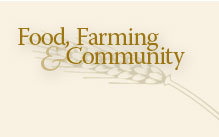
Food, Farming and Community Resources developed by Michigan State University Museum has grown from field work and applied research.
Creative Change Educational Solutions (Ypsilanti, MI) has focused on integrated sustainability education as a vital part of community revitalization. The curriculum presented here is a product of their work.
The expression and experiences presented in the readers' theatre script have been drawn from the field research and documentary media of Cynthia Vagnetti and her Voices from the Fields Collection.
Meet some of the farmers and ranchers whose voices and experiences are included in What Will Be in the Fields Tomorrow?
Essay: The Oral History Interview
"One of the most precious resources for understanding the conditions of our society and culture is the oral history interview. It allows us to see one human event from a multitude of perspectives and is a flexible means to creating a variety of literary forms."
Read More
Essay: Cynthia Vagnetti's Voices from the Field Collection
The authentic voices of farmers and ranchers from across American have been documented and are the basis for this collection. Since 1991 Vagnetti has interviewed, filmed and photographed over 100 American farmers and ranchers. This research base represents farmers in 25 states, with nearly 200 hours of videotaped oral history interviews and contextual footage, and 2,000 documentary photographs.
Read More
Essay: Creating the Script & Audience Surveys
To insure authentic content, farmers, agricultural educators, and humanities and theatre professionals have been involved in the development of the script. What Will Be in the Fields Tomorrow? was shaped with purposeful aesthetic and political decisions that
- embody issues in the actual words and experiences of real farmers
- increase awareness of sustainability in farming
- broaden awareness in the general public
- is accessible in format and flexibility
Fields was created to be a vehicle to educate and to bring about real conversation and discussion about farming and food production, both within agricultural communities and among general consumers.
This essay describes script development and reports the findings of audience surveys from six pilot sites. Audiences included sustainable, organic, and general public groups. Read More



